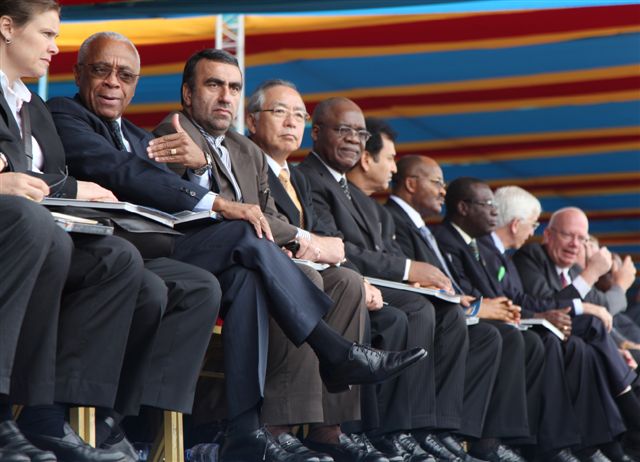Impact and Leadership
Three decades of transforming demographic data into governance tools across Africa. From census modernization to national family planning programs, Dr Dackam Ngatchou's work demonstrates the power of evidence-based policy dialogue.

Representing UNFPA among the ambassadors and diplomatic corps accredited to the Democratic Republic of the Congo.
Career Timeline
- PhD in Demography from Université Paris 1 Panthéon-Sorbonne (1987)
- Dissertation on child mortality determinants established maternal education as key survival factor
- Published foundational work: Éducation de la mère et la mortalité des enfants en Afrique
- Trained new generation of African demographers at IFORD
Impact:
Established theoretical foundation linking education, health, and demographic transition that would guide his policy career
- Advised 20+ countries on census planning, demographic analysis, and GPS/GIS integration
- Led Senegal 2003 census modernization - model for the region
- Developed cost-optimization frameworks adopted across West Africa
- Created thematic census product methodology linking data to development plans
- Introduced digital cartography to rural census operations
Impact:
Transformed census operations from data collection exercises into strategic policy instruments, reducing costs while improving reliability
- Coordinated UN agencies (UNFPA, WHO, UNICEF, UNAIDS) on population and health strategy
- Integrated census data into poverty-reduction frameworks
- Launched reproductive health logistics and condom programming
- Strengthened national statistical office capacity and inter-ministerial collaboration
Impact:
Established model for UN inter-agency coordination and evidence-based policy dialogue with governments
- Orchestrated creation of Programme National de Planification Familiale (PNPF) - DRC's first national family planning program
- Convened landmark 2012 Kinshasa Family Planning Conference
- Mobilized multi-stakeholder partnerships (USAID, DFID, World Bank, Gates Foundation)
- Engaged faith organizations and civil society in family planning dialogue
- Elevated contraceptive prevalence and maternal health as government priorities
Impact:
Transformed fragmented donor projects into permanent government-led program documented in academic literature (Bertrand 2022)
- Advisory services to governments, UN agencies, and development banks
- Expertise in census methodology, M&E, and demographic governance
- Mentorship of young demographers and statisticians
- Knowledge transfer on digital census transition and data sovereignty
- Continued advocacy for demographic dividend policies
Impact:
Sharing 30 years of field expertise to strengthen next generation of demographic leadership and institutional memory
Detailed Impact Stories
Concrete examples of how demographic expertise transforms into policy outcomes
Senegal 2003: Model Census for West Africa
Challenge
Outdated cartography, fragmented institutional coordination, and limited analytical capacity risked census delays and poor data quality.
Solution
- Formed multi-agency task force uniting National Statistics Office, Ministry of Planning, and donor partners
- Piloted GPS mapping technology in rural zones to correct enumeration boundaries
- Trained national experts through regional workshops
- Produced thematic reports aligned with poverty-reduction and gender-equality frameworks
Outcome
Census completed on schedule with unprecedented accuracy. Model replicated in Burkina Faso (2006) and Cameroon (2005). Became template for UNFPA regional guidelines.
Data reliability improves when technical rigor, national capacity, and policy relevance are addressed simultaneously.
DRC: Creation of the PNPF
Challenge
Extremely low contraceptive prevalence, absence of national family planning framework, fragmented donor interventions, and limited government ownership.
Solution
- Initiated high-level policy dialogue at Prime Minister's Office
- Convened health, planning, and finance ministries with civil society and faith organizations
- Supported drafting of National Family Planning Strategic Plan (2010-2015)
- Organized 2012 Kinshasa Conference bringing together government, donors, and implementing partners
- Mobilized coordinated funding from USAID, DFID, World Bank, and Gates Foundation
Outcome
Government officially adopted the PNPF as permanent national program. Institutionalized family planning within Ministry of Health. External validation in Bertrand (2022) academic study.
This policy breakthrough stemmed from UNFPA's diplomatic engagement and technical leadership under Dr Dackam Ngatchou.
Regional Census Cost Optimization
Challenge
Census operations consuming 60-80% of national statistical budgets while delivering limited policy impact.
Solution
- Developed integrated planning framework linking cartography, enumeration, and processing
- Introduced early GPS mapping to reduce fieldwork expenses
- Designed thematic census products aligned with national development priorities
- Created domestic funding mobilization strategies reducing donor dependency
Outcome
Framework adopted through UNFPA Technical Guidelines and African Census Coordination Mechanism. Influenced UN Principles and Recommendations for Population and Housing Censuses (Rev. 3).
Turning data into policy products attracts domestic funding and donor confidence.